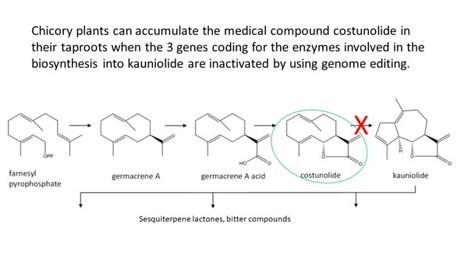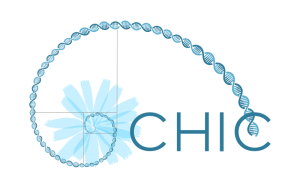An international research team from KeyGene and Wageningen University & Research, both in the Netherlands, and Leibniz Institute of Plant Biochemistry in Germany, have developed chicory plants that accumulate costunolide, a plant metabolite known for its anticancer activity. The scientists used the genome-editing technique CRISPR Cas9 to block the further processing of costunolide into other plant metabolites, resulting in the accumulation of the medical compound. The team published their results in a paper in Frontiers in Plant Science.
Costunolide was first extracted from Saussurea costus, a wild plant that grows in the Himalayas and is now cultivated in India and has a low yield.
Chicory also produces costunolide, but does not accumulate because the metabolite, which serves as an intermediate, is rapidly converted in the taproots to bitter-tasting metabolites belonging to the sesquiterpene lactones. For the production of these metabolites, the step from costunolide to kauniolide is crucial. This step is accomplished by the enzyme kauniolide synthase. The research team identified three copies of the gene that codes for this enzyme.
All three copies are important: only after blocking the activity of all three, using CRISPR/Cas9, was the production of kauniolide blocked. This resulted in an accumulation of costunolide in the tap roots of chicory plants.


 This project has received funding from the EU Horizon 2020 research & innovation programme under grant agreement N. 760891.
This project has received funding from the EU Horizon 2020 research & innovation programme under grant agreement N. 760891.

